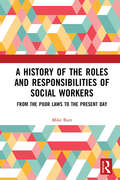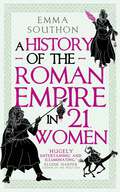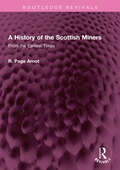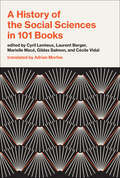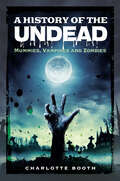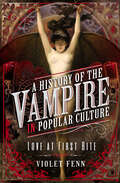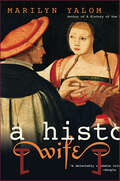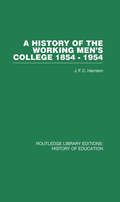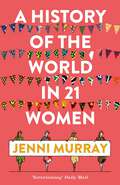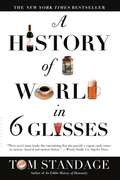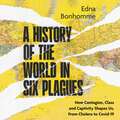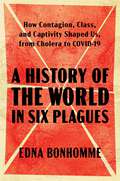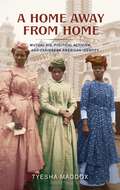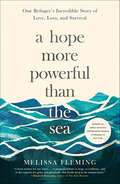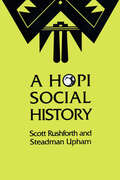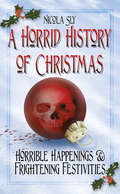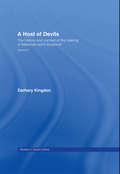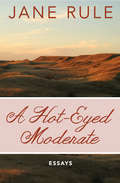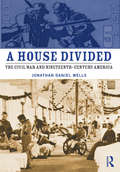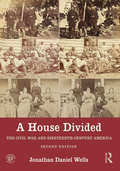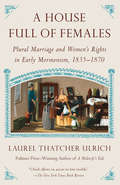- Table View
- List View
A History of the Roles and Responsibilities of Social Workers: From the Poor Laws to the Present Day
by Mike BurtTracing the origin of work with the ‘impotent poor’ under the Poor Laws, to social workers’ current responsibilities towards vulnerable people, this book introduces the reader to the way in which the identification of particular social problems at the end of the nineteenth century led to the emergence of a wide range of separate occupational groups and voluntary workers, which were sometimes, but increasingly, referred to as social workers. Using an extended single chronological historical narrative and analysis, which draws heavily on original archival sources and contemporary literature, it addresses the changes which took place as part of the welfare state and the identification of common roles and responsibilities by social workers, which led to the formation of the British Association of Social Workers in 1970. By highlighting the changes and continuities in these roles and responsibilities, this book will be of interest to all academics, students, and practitioners working within social work, who wish to know more about the origins of their discipline and the current state of the profession today.
A History of the Roman Empire in 21 Women
by Emma SouthonRome as you&’ve never seen it before – brazenly unconventional, badly behaved and ever so feminine. &‘Hugely entertaining and illuminating&’ —Elodie Harper, author of The Wolf Den A WATERSTONES BEST HISTORY BOOK OF 2023 Here&’s how the history of the Roman Empire usually goes… We kick off with Romulus murdering his brother, go on to Brutus overthrowing Tarquin, bounce through an appallingly tedious list of battles and generals and consuls, before emerging into the political stab-fest of the late Republic. After &‘Et tu, Brute?&’, it runs through all the emperors, occasionally nodding to a wife or mother to show how bad things get when women won&’t do as they&’re told, until Constantine invents Christianity only for Attila the Hun to come and ruin everything. Let&’s tear up this script. The history of Rome and its empire is so much more than these &‘Important Things&’. In this alternative history, Emma Southon tells another story about the Romans, one that lives through Vestal Virgins and sex workers, business owners and poets, empresses and saints. Discover how entrepreneurial sex worker Hispala Faecenia uncovered a conspiracy of treason, human sacrifice and Bacchic orgies so wild they would make Donna Tartt blush, becoming one of Rome&’s unlikeliest heroes. Book yourself a table the House of Julia Felix and get to know Pompeii&’s savviest businesswoman and restauranteur. Indulge in an array of locally sourced delicacies as you take in the wonderful view of Mount Vesuvius… what could possibly go wrong? Join the inimitable Septimia Zenobia, who – after watching a series of incompetent, psychopathic and incompetently psychopathic emperors almost destroy the Empire – did what any of us would do. She declared herself Empress, took over half the Roman Empire and ran it herself.
A History of the Scottish Miners: From the Earliest Times (Routledge Revivals)
by Robert Page ArnotFirst published in 1955, A History of the Scottish Miners recounts the peculiar circumstances of the seventeenth and eighteenth centuries, and the laws that placed the miners under conditions unique in Europe. Carrying onto the nineteenth century, the author deals with the first trade unions, the period of Alexander McDonald and Keir Hardie, ending in the great strike of 1894 and the formation of the Scottish Miners’ Federation, embracing eight county associations. From 1894 onwards, Robert Smillie led the Scots in good times and bad, up to the ordeal of the First World War. The effect in Scotland of the great lockouts of 1921 and 1926, with Robert Smillie no longer chairman of the British miners but still the leader in Scotland, is set out in detail. Then after a time of troubles, the Scots miners developed their organisations during the war and, before its end, under new leaders, they achieved a single union for Scotland. This book will be of interest to students of history, sociology, economics and political science.
A History of the Social Sciences in 101 Books
by Cécile Vidal Laurent Berger Cyril Lemieux Marielle Macé Gildas SalmonAn intellectual history of the social sciences that offers a library of 101 books that broke new ground for the field.What are the social sciences? What unifies them? This essay collection seeks to answer these and other important questions as it considers how the field has developed over the years, from post–World War II to the present day throughout the world. Edited by Cyril Lemieux, Laurent Berger, Marielle Macé, Gildas Salmon, and Cécile Vidal, A History of the Social Sciences in 101 Books brings together a diverse range of researchers in the social sciences to present short essays on 101 books—both renowned and lesser known—that have shaped the field, from Theodor Adorno and Max Horkheimer&’s Dialectic of Enlightenment (1947) to Michel Aglietta&’s Money: 5000 Years of Debt and Power (2016).While there have been surveys and intellectual histories of particular disciplines within the social sciences (history, anthropology, sociology), until now there has been no intellectual history of the social sciences as a unified whole. Far from presenting a fixed and frozen canon, A History of the Social Sciences in 101 Books offers instead a moving, multiform landscape with no settled questions, only an ongoing series of new perspectives and challenges to previously established grounding.
A History of the Undead: Mummies, Vampires and Zombies
by Charlotte BoothA history of Western culture’s fascination with undead creatures in film and television.Are you a fan of the undead? Watch lots of mummy, zombie and vampire movies and TV shows? Have you ever wondered if they could be “real?”This book, A History of the Undead, unravels the truth behind these popular reanimated corpses.Starting with the common representations in Western media through the decades, we go back in time to find the origins of the myths. Using a combination of folklore, religion and archaeological studies we find out the reality behind the walking dead. You may be surprised at what you find . . .
A History of the Undead: Mummies, Vampires and Zombies
by Charlotte BoothA history of Western culture’s fascination with undead creatures in film and television.Are you a fan of the undead? Watch lots of mummy, zombie and vampire movies and TV shows? Have you ever wondered if they could be “real?”This book, A History of the Undead, unravels the truth behind these popular reanimated corpses.Starting with the common representations in Western media through the decades, we go back in time to find the origins of the myths. Using a combination of folklore, religion and archaeological studies we find out the reality behind the walking dead. You may be surprised at what you find . . .
A History of the Vampire in Popular Culture: Love at First Bite
by Violet FennAn exploration of the continuing appeal of vampires in cultural and social history. Our enduring love of vampires—the bad boys (and girls) of paranormal fantasy—has persisted for centuries. Despite being bloodthirsty, heartless killers, vampire stories commonly carry erotic overtones that are missing from other paranormal or horror stories. Even when monstrous teeth are sinking into pale, helpless throats—especially then—vampires are sexy. But why? In A History Of The Vampire In Popular Culture, author Violet Fenn takes the reader through the history of vampires in &“fact&” and fiction, their origins in mythology and literature, and their enduring appeal on TV and film. We&’ll delve into the sexuality--and sexism--of vampire lore, as well as how modern audiences still hunger for a pair of sharp fangs in the middle of the night.
A History of the Wife
by Marilyn Yalom“A valentine to wives . . . after reading Yalom's history, one thing is clear: marriage is not for the faint-hearted.” —USA TodayHow did marriage, considered a religious duty in medieval Europe, become a venue for personal fulfillment in contemporary America? How did the notion of romantic love, a novelty in the Middle Ages, become a prerequisite for marriage today? And, if the original purpose of marriage was procreation, what exactly is the purpose of marriage for women now?Combining “a scholar's rigor and a storyteller's craft” (San Jose Mercury News), distinguished cultural historian Marilyn Yalom charts the evolution of marriage in the Judeo-Christian world through the centuries and shows how radically our ideas about marriage have changed.For any woman who is, has been, or ever will be married, this intellectually vigorous and gripping historical analysis of marriage sheds new light on an institution most people take for granted, and that may, in fact, be experiencing its most convulsive upheaval since the Reformation.“Scholarly yet delectably readable volume.” —People“Yalom’s sweeping history not only offers a clear overview of the role of the wife over the centuries but also recounts the experiences of specific individuals.” —Los Angeles Times“Packed with rich material.” —The New York Times Book Review“Portrays the gradual but relentless shift from subjugation toward partnership . . . collating what information is available about how women have spent, and felt about, their married lives.” —Chicago Tribune“Yalom’s brilliant deconstruction of the married state for women is at once reassuring and shocking . . . perfectly fascinating.” —Diane Johnson, New York Times–bestselling author of Le Divorce
A History of the Working Men's College: 1854-1954
by J F HarrisonOriginally published in 1954, this is the first full-length account of the history of the Working Men’s College in St.Pancras, London. One hundred and fifty years on from its foundation in 1854, it is the oldest adult educational institute in the country. Self-governing and self-financing, it is a rich part of London’s social history. The college stands out as a distinctive monument of the voluntary social service founded by the Victorians, unchanged in all its essentials yet adapting itself to the demands of each generation of students and finding voluntary and unpaid teachers to continue its tradition.
A History of the World in 21 Women: A Personal Selection
by Jenni MurrayFrom the bestselling author of A History of Britain in 21 Women The history of the world is the history of great women. Marie Curie discovered radium and revolutionised medical science. Empress Cixi transformed China. Frida Kahlo turned an unflinching eye on life and death. Anna Politkovskaya dared to speak truth to power, no matter the cost. Their names should be shouted from the rooftops. And that is exactly what Jenni Murray is here to do.
A History of the World in 6 Glasses
by Tom StandageFrom beer to Coca-Cola, the six drinks that have helped shape human history Throughout human history, certain drinks have done much more than just quench thirst. As Tom Standage relates with authority and charm, six of them have had a surprisingly pervasive influence on the course of history, becoming the defining drink during a pivotal historical period. A History of the World in 6 Glasses tells the story of humanity from the Stone Age to the 21st century through the lens of beer, wine, spirits, coffee, tea, and cola. Beer was first made in the Fertile Crescent and by 3000 B.C.E. was so important to Mesopotamia and Egypt that it was used to pay wages. In ancient Greece wine became the main export of her vast seaborne trade, helping spread Greek culture abroad. Spirits such as brandy and rum fueled the Age of Exploration, fortifying seamen on long voyages and oiling the pernicious slave trade. Although coffee originated in the Arab world, it stoked revolutionary thought in Europe during the Age of Reason, when coffeehouses became centers of intellectual exchange. And hundreds of years after the Chinese began drinking tea, it became especially popular in Britain, with far-reaching effects on British foreign policy. Finally, though carbonated drinks were invented in 18th-century Europe they became a 20th-century phenomenon, and Coca-Cola in particular is the leading symbol of globalization. For Tom Standage, each drink is a kind of technology, a catalyst for advancing culture by which he demonstrates the intricate interplay of different civilizations. You may never look at your favorite drink the same way again.
A History of the World in Six Plagues: How Contagion, Class and Captivity Shape Us, from Cholera to Covid-19
by Edna BonhommeA History of the World in Six Plagues unveils a powerful and unsettling truth: epidemic diseases enter the world by chance, but they become catastrophic by human design.In this groundbreaking work, Bonhomme explores how six pivotal diseases-Cholera, HIV/AIDS, the Spanish Flu, Sleeping Sickness, Ebola, and COVID-19-have shaped the trajectory of human history. With vivid storytelling and rigorous research, she reveals how pandemics have consistently widened the gaps in racial, economic, and sociopolitical divides, from the slave ships of the Atlantic to today's fractured healthcare systems.How did a colonial obsession with sugar amplify the devastation of Cholera? Why did sleeping sickness become a weapon of empire in Tanzania? And how has COVID-19 magnified inequities in our modern, interconnected world?Bonhomme's incisive analysis transforms our understanding of public health, not as a neutral force but as a stage where power, policy, and prejudice collide. Urgent and illuminating, A History of the World in Six Plagues is not just a history of disease - it is a call to reimagine a more equitable future in the face of ongoing global health challenges.'This book tells the accounts of people who deserved better. It is also a story of redemption, and of the little child in all of us, curled up alone in a huge bed, without her parents, who wants to be healthy and free.'
A History of the World in Six Plagues: How Contagion, Class and Captivity Shape Us, from Cholera to Covid-19
by Edna BonhommeA History of the World in Six Plagues unveils a powerful and unsettling truth: epidemic diseases enter the world by chance, but they become catastrophic by human design.In this groundbreaking work, Bonhomme explores how six pivotal diseases-Cholera, HIV/AIDS, the Spanish Flu, Sleeping Sickness, Ebola, and COVID-19-have shaped the trajectory of human history. With vivid storytelling and rigorous research, she reveals how pandemics have consistently widened the gaps in racial, economic, and sociopolitical divides, from the slave ships of the Atlantic to today's fractured healthcare systems.How did a colonial obsession with sugar amplify the devastation of Cholera? Why did sleeping sickness become a weapon of empire in Tanzania? And how has COVID-19 magnified inequities in our modern, interconnected world?Bonhomme's incisive analysis transforms our understanding of public health, not as a neutral force but as a stage where power, policy, and prejudice collide. Urgent and illuminating, A History of the World in Six Plagues is not just a history of disease - it is a call to reimagine a more equitable future in the face of ongoing global health challenges.'This book tells the accounts of people who deserved better. It is also a story of redemption, and of the little child in all of us, curled up alone in a huge bed, without her parents, who wants to be healthy and free.'
A History of the World in Six Plagues: How Contagion, Class, and Captivity Shaped Us, from Cholera to COVID-19
by Edna BonhommeA deeply reported, insightful, and literary account of humankind&’s battles with epidemic disease, and their outsized role in deepening inequality along racial, ethnic, class, and gender lines—in the vein of Medical Apartheid and Killing the Black Body.Epidemic diseases enter the world by chance, but they become catastrophic by human design. With clear-eyed research and lush prose, A History of the World in Six Plagues shows that throughout history, outbreaks of disease have been exacerbated by and gone on to further expand the racial, economic, and sociopolitical divides we allow to fester in times of good health. Princeton-trained historian Edna Bonhomme&’s examination of humanity&’s disastrous treatment of pandemic disease takes us across place and time from Port-au-Prince to Tanzania, and from plantation-era America to our modern COVID-19-scarred world to unravel shocking truths about the patterns of discrimination in the face of disease. Based on in-depth research and cultural analysis, Bonhomme explores Cholera, HIV/AIDS, the Spanish Flu, Sleeping Sickness, Ebola, and COVID-19 amidst the backdrop of unequal public policy. But much more than a remarkable history, A History of the World in Six Plagues is also a rising call for change.
A History of the World in Twelve Shipwrecks
by David GibbinsFrom renowned underwater archaeologist David Gibbins comes an exciting and rich narrative of human history told through the archaeological discoveries of twelve shipwrecks across time.The Viking warship of King Cnut the Great. Henry VIII's the Mary Rose. Captain John Franklin's doomed HMS Terror. The SS Gairsoppa, destroyed by a Nazi U-boat in the Atlantic during World War II.Since we first set sail on the open sea, ships and their wrecks have been an inevitable part of human history. Archaeologists have made spectacular discoveries excavating these sunken ships, their protective underwater cocoon keeping evidence of past civilizations preserved. Now, for the first time, world renowned maritime archeologist David Gibbins ties together the stories of some of the most significant shipwrecks in time to form a single overarching narrative of world history.A History of the World in Twelve Shipwrecks is not just the story of those ships, the people who sailed on them, and the cargo and treasure they carried, but also the story of the spread of people, religion, and ideas around the world; it is a story of colonialism, migration, and the indominable human spirit that continues today. From the glittering Bronze Age, to the world of Caesar's Rome, through the era of the Vikings, to the exploration of the Arctic, Gibbins uses shipwrecks to tell all.Drawing on decades of experience excavating shipwrecks around the world, Gibbins reveals the riches beneath the waves and shows us how the treasures found there can be a porthole to the past that tell a new story about the world and its underwater secrets.
A Home Away from Home: Mutual Aid, Political Activism, and Caribbean American Identity
by Tyesha MaddoxA Home Away from Home examines the significance of Caribbean American mutual aid societies and benevolent associations to the immigrant experience, particularly their implications for the formation of a Pan-Caribbean American identity and Black diasporic politics.At the turn of the twentieth century, New York City exploded with the establishment of mutual aid societies and benevolent associations. Caribbean immigrants, especially women, eager to find their place in a bustling new world, created these organizations, including the West Indian Benevolent Association of New York City, founded in 1884. They served as forums for discussions on Caribbean American affairs, hosted cultural activities, and provided newly arrived immigrants with various forms of support, including job and housing assistance, rotating lines of credit, help in the naturalization process, and its most popular function—sickness and burial assistance. In examining the number of these organizations, their membership, and the functions they served, Tyesha Maddox argues that mutual aid societies not only fostered a collective West Indian ethnic identity among immigrants from specific islands, but also strengthened kinship networks with those back home in the Caribbean. Especially important to these processes were Caribbean women such as Elizabeth Hendrickson, co-founder of the American West Indian Ladies’ Aid Society in 1915 and the Harlem Tenants’ League in 1928.Immigrant involvement in mutual aid societies also strengthened the belief that their own fate was closely intertwined with the social, economic, and political welfare of the Black international community. A Home Away from Home demonstrates how Caribbean American mutual aid societies and benevolent associations in many ways became proto-Pan-Africanist organizations.
A Hope More Powerful Than the Sea: One Refugee's Incredible Story of Love, Loss, and Survival
by Melissa FlemingThe gripping story of a young woman who fled civil war in Syria and endured a harrowing journey across the Mediterranean for a chance of a better life.Adrift in a frigid sea, no land in sight, just debris from the ship’s wreckage and floating corpses all around, nineteen-year-old Doaa Al Zamel stays afloat on a small inflatable ring and clutches two little girls—barely toddlers—to her body. The children had been thrust into Doaa’s arms by their drowning relatives, all refugees who boarded a dangerously overcrowded ship bound for Italy and a new life. For days as Doaa drifts, she prays for rescue and sings to the babies in her arms. She must stay alive for them. She must not lose hope.A Hope More Powerful Than the Sea chronicles the life of Doaa, a Syrian girl whose life was upended in 2011 by the onset of her country’s brutal civil war. Doaa and her fiancé, Bassem, decide to flee to Europe to seek safety and an education, but four days after setting sail on a smuggler’s dilapidated fishing vessel along with five hundred other refugees, their boat is struck and begins to sink. This is the moment when Doaa’s struggle for survival really begins.This emotionally charged, eye-opening true story that represents the millions of unheard voices of refugees who risk everything in a desperate search for the promise of a safe future. In the midst of the most pressing international humanitarian crisis of our time, Melissa Fleming paints a vivid, unforgettable portrait of the triumph of the human spirit.“Urgently required reading.” —People“Deeply affecting . . . Fleming brings a moral urgency to the narrative.” —The New Yorker“Fleming deftly illustrates the pain of those who choose to leave Syria . . . and her book is ultimately a story of hope.” —Newsweek
A Hopi Social History
by Steadman Upham Scott RushforthUsing case studies, A Hopi Social History investigates the mysterious abandonments of the Western Pueblo region in late prehistory, the initial impact of European diseases on the Hopis, Hopi resistance to European domination between 1680 and 1880, the split of Oraibi village in 1906, and some responses by the Hopis to modernization in the twentieth century.
A Hopi Social History
by Steadman Upham Scott Rushforth&“Incorporate[s] a multitude of theoretical approaches about Hopi sociological life . . . Ranging from prehistoric times until contemporary times.&” —Indigenous Nations Studies Journal All anthropologists and archaeologists seek to answer basic questions about human beings and society. Why do people behave the way they do? Why do patterns in the behavior of individuals and groups sometimes persist for remarkable periods of time? Why do patterns in behavior sometimes change? A Hopi Social History explores these basic questions in a unique way. The discussion is constructed around a historically ordered series of case studies from a single sociocultural system (the Hopi) in order to understand better the multiplicity of processes at work in any sociocultural system through time. The case studies investigate the mysterious abandonments of the Western Pueblo region in late prehistory, the initial impact of European diseases on the Hopis, Hopi resistance to European domination between 1680 and 1880, the split of Oraibi village in 1906, and some responses by the Hopis to modernization in the twentieth century. These case studies provide a forum in which the authors examine a number of theories and conceptions of culture to determine which theories are relevant to which kinds of persistence and change. With this broad theoretical synthesis, the book will be of interest to students and scholars in the social sciences. &“A foundation for general discourse on anthropological theory and explanation . . . Covering the prehistoric, Spanish, early historic, and contemporary periods.&” —American Indian Quarterly
A Horrid History of Christmas: Horrible Happenings and Frightening Festivities
by Nicola SlyThis collection of historic horrid happenings from across the country demonstrates that Christmas is not necessarily a time of peace, joy and goodwill to all men. Festive tragedies include the avalanche in Lewes, which destroyed several cottages in 1836, killing eight of the occupants and injuring many more, and the fall of a chimney in Bradford in 1882, which claimed fifty-four lives. There are fatal rail crashes in Oxfordshire, Bedfordshire, Cheshire, Cumbria and Scotland; freak weather conditions and devastating fires, such as the Christmas Eve fire in Glasgow that cost the lives of four firemen in 1927. The holiday season has witnessed a plethora of almost unbelievable accidents, such as the amateur mechanic who died with his head stuck in a car engine, the footballer who leaped into a quarry to retrieve a lost ball, and the Christmas party guest who fell down a flight of stairs and broke his neck. Among the chilling crimes featured here is that of Nottinghamshire man Edward Kesteven, who killed his wife on Christmas Day 1894, and the murder of Thirza Kelly in Norfolk by a local teenager on Christmas Eve 1900. Full of merry madness and hearty heartache, A Horrid History of Christmas will make you want to bypass the festivities altogether!
A Host of Devils: The History and Context of the Making of Makonde Spirit Sculpture (Studies in Visual Culture)
by Zachary KingdonA Host of Devils provides an in-depth account of the background, origin and development of the spirit figure sculptures which emerged during colonial times among the Makonde people of Mozambique.The creation of such works is shown to connect with a regional system of knowledge and practice, within which spirits function as a format for expression. The book describes the ways in which the sculpture emerged, as well as the author's experience of learning how to carve.
A Hot-Eyed Moderate: Essays
by Jane RuleThe essays in this inspiring collection analyze the craft of writing and the art of living and loving Jane Rule shares her insights into the creative process, sexual fidelity, feminist politics, and the transformative power of love. Part I—&“On Writing&”—dispenses advice (writing is &“a craft that has to be practiced&”); offers observations (&“The creative process in any art takes time&”); and dissects the writer-publisher relationship, both feminist and traditional. Part II—&“Writing for the Gay Press&”—discusses, among other things, what it means to be a lesbian writer. With chapters like &“The Myth of Genital Jealousy&” and &“You Cannot Judge a Pumpkin&’s Happiness by the Smile Upon Its Face,&” this collection shatters common myths such as why you should always write about what you know. There are also moving pieces about Rule&’s grandmother, artists who have influenced Rule, and what it is to be human and female in your time. From censorship to morality in literature to how men and women can live together in peace, A Hot-Eyed Moderate is Jane Rule at her provocative best.
A House Divided: The Civil War and Nineteenth-Century America
by Jonathan Daniel WellsThe Civil War is one of the most defining eras of American history, and much has been written on every aspect of the war. The volume of material available is daunting, especially when a student is trying to grasp the overall themes of the period. Jonathan Wells has distilled the war down into understandable, easy-to-read sections, with plenty of maps and illustrations, to help make sense of the battles and social, political, and cultural changes of the era. Presented here is information on: the home front the battles, both in the East and the West the status of slaves women’s role in the war and its aftermath literature and public life international aspects of the war and much more! Students will also find helpful study aids on the companion website for the book. A House Divided provides a short, readable survey of the Civil War and the Reconstruction period afterward, focusing not only on the battles, but on how Americans lived during a time of great upheaval in the country’s history, and what that legacy has meant to the country today.
A House Divided: The Civil War and Nineteenth-Century America
by Jonathan Daniel WellsConsolidating one of the most complex and multi-faceted eras in American History, this new edition of Jonathan Wells’s A House Divided unifies the broad and varied scholarship on the American Civil War. Amassing a variety of research, this accessible and readable text introduces readers to both the war and the Reconstruction period, and how Americans lived during this time of great upheaval in the country's history. Designed for a variety of subjects and teaching styles, this text not only looks at the Civil War from a historical perspective, but also analyzes its ramifications on the United States and American identities through the present day. This second edition has been updated throughout, incorporating new scholarship from recent studies on the Civil War era, and includes additional photographs and maps (now incorporated throughout the text), updated bibliographies, and a supplementary companion website.
A House Full of Females: Plural Marriage and Women's Rights in Early Mormonism, 1835-1870
by Laurel Thatcher UlrichFrom the author of A Midwife's Tale, winner of the Pulitzer Prize and the Bancroft Prize for History, and The Age of Homespun--a revelatory, nuanced, and deeply intimate look at the world of early Mormon women whose seemingly ordinary lives belied an astonishingly revolutionary spirit, drive, and determination. A stunning and sure-to-be controversial book that pieces together, through more than two dozen nineteenth-century diaries, letters, albums, minute-books, and quilts left by first-generation Latter-day Saints, or Mormons, the never-before-told story of the earliest days of the women of Mormon "plural marriage," whose right to vote in the state of Utah was given to them by a Mormon-dominated legislature as an outgrowth of polygamy in 1870, fifty years ahead of the vote nationally ratified by Congress, and who became political actors in spite of, or because of, their marital arrangements. Laurel Thatcher Ulrich, writing of this small group of Mormon women who've previously been seen as mere names and dates, has brilliantly reconstructed these textured, complex lives to give us a fulsome portrait of who these women were and of their "sex radicalism"--the idea that a woman should choose when and with whom to bear children.From the Hardcover edition.
